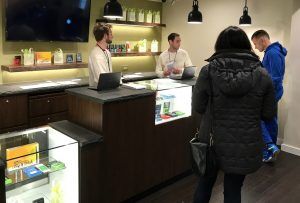
Customers visit TerraVida Holistic Center after the Pennsylvania dispensary’s Feb. 17 opening. (Photo courtesy of TerraVida)
Pennsylvania’s first days of medical marijuana sales have been limited by a lack of product variety, but overall, business owners are calling the launch a success.
While supplies are limited based on only one producer providing product, business owners don’t seem overly concerned about inventory.
As of Feb. 15, six dispensaries had begun selling medical cannabis in the form of concentrates and oils:
- Cresco Yeltrah in Butler
- Organic Remedies, Enola
- Keystone Canna Remedies, Bethlehem
- Solevo, Pittsburgh
- TerraVida Holistic Center, Sellersville
- Keystone Shops, Devon

“This week will be telling, but I think we’ll be OK.”
Cresco Yeltrah is the only producer/processor with its own cannabis ready for sale at the moment, and several businesses sold out some of their products over the weekend. But they didn’t seem worried about supply.
Pennsylvania’s medical market has developed rapidly since 2016, when Gov. Tom Wolf signed a law legalizing sales of medical marijuana.
Legalized MMJ was the culmination of years of negotiations and delays, but the state is now poised to become one of the largest MMJ markets in the country.
According to the state, more than 700 doctors have either completed or are in the process of completing the necessary steps to certify patients.
Nearly 3,000 patients have medical marijuana ID cards, and more than 17,000 are registered for the program.
The law allows for 25 cultivation licenses and 50 dispensary licenses. Each dispensary is allotted up to three different locations.
Two more dispensaries were recently approved to begin sales – Cure Pennsylvania in Phoenixville and Cure Pennsylvania in Lancaster – bringing to eight the number of MMJ outlets.
The program doesn’t allow smokable flower or edibles, but it does permit the sale of concentrates, tinctures and oils.
Pennsylvania’s program includes 17 qualifying conditions for patients, including severe pain.
So far, so good
TerraVida Holistic Center in Sellersville, a Philadelphia suburb, started sales Saturday.
Co-owner Chris Visco said the first day went great, with about 150 customers buying from her store.
She estimated total sales for the first day were around $20,000.
Customers were spending a little over $200 per transaction.
The situation was similar at Keystone Canna, which opened Friday.
By Monday, Guadagnino said his store had served about 150 patients, and he estimated total sales at $25,000-$30,000.
His customers were also averaging about $200 per transaction.
Eric Hauser, co-owner of Organic Remedies in Enola, near Harrisburg, said sales have been going well since he opened Friday.
He estimated he’s had about 80 customers who averaged $200-$300 per transaction.
Hauser sold out of most concentrates, capsules and 1:1 THC-CBD vape pens. He’s expecting another shipment Thursday.
“So we should be in pretty good shape,” he said.
To conserve its supplies, TerraVida went for a softer open.
“We may run out of more products today, but we’re getting another shipment tomorrow,” Visco said.
What are people buying?
At both Keystone Canna and TerraVida, live resin cartridges and concentrates were best-sellers.
In terms of strains, Guadagnino said Durban Poison, a sativa, was popular and Bio Jesus, an indica, also sold well.
Guadagnino was selling live-resin, 500-milligram cartridges for $65. Half grams of concentrates sold for $35 and full grams for $70.
Experienced patients have been interested in Rick Simpson Oil cartridges, Guadagnino said.
Less-experienced MMJ patients have been favoring products high in CBD, according to Guadagnino.
“They have good medicinal value,” he said, “and they’re good for people who are not too familiar with THC products.”
Visco said TerraVida sold through its CBD products quickly.
“We could have sold a lot more CBD products had we had them in stock,” she said.
“We sold out of our THC-CBD 1:1 capsules, which were the only capsules we had during the day.”
TerraVida had one shatter strain, and it sold out. People also wanted to buy wax and budder.
“A lot of concentrates,” Visco said.
At TerraVida, a gram of shatter was one of the more expensive products on the store’s shelves at $75. A gram of wax was selling for $60 and budder and live sugar for $65.
A 500-milligram cartridge of CO2 or live resin cannabis oil was selling for $60.
“We looked at our pricing and we feel that we’re very competitive compared to other states that have come before us,” Visco said.
Hauser differentiated Organic Remedies customers by novice and experienced.
The novice customers were more likely to favor the higher CBD oils, while the more experienced customers went for shatter, budder and Rick Simpson Oils, he said.
“We’re still working off a limited product selection, so that’s pretty much the range of what we have,” Hauser said.
Organic Remedies was selling 500-milligram cartridges for $70-$95. A gram of concentrate cost $85.
Looking ahead
Visco is also looking forward to more growers coming online to bolster her product level and add more assortment of products.
She expects two more growers to be providing product to the market once they’ve harvested their marijuana.
“We definitely need more CBD,” she said. “We have a lot of children that need to be treated for autism and epilepsy.”
Guadagnino would like to see flower added to the available products as well as expanded qualifying conditions.
“We want to treat all their symptoms,” he said. “If (the state) could expand that list, it would make patients feel more comfortable becoming part of the program.”
Hauser pointed out that the current prices are pretty high, and introducing flower to the market would help lower the cost and increase access.
“I’m a health-care provider,” he said. “So I don’t promote smoking, but in this instance you have to look at the risk versus the benefit.”
Bart Schaneman can be reached at [email protected]


